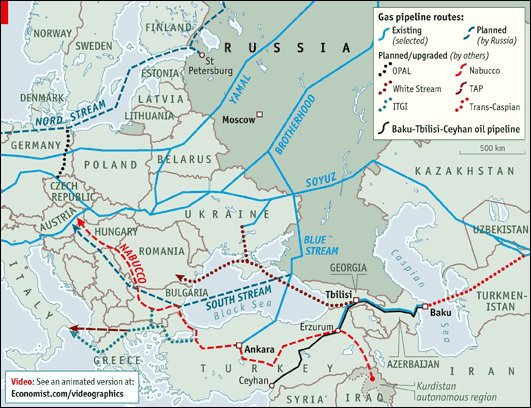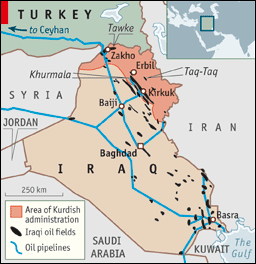When the United States invaded Iraq and overthrew Saddam Hussein, many people believed that Iraq’s oil sector would produce enough revenue to help pull it out of its economic doldrums. Those hopes proved overly optimistic. Through the intervening years, Iraq’s oil sector has developed more slowly than most people had hoped. Late last month Iraq held an auction in Baghdad for the rights to help the country develop its oil fields. According to Stanley Reed, many analysts have portrayed the auction “as a dud” [“Will Iraq Be an Oil Power Again?”, BusinessWeek, 10 August 2009 print issue]. Reed believes that Iraq may be on the verge of becoming a 600-pound oil gorilla that will be able to go toe-to-toe with Saudi Arabia. The two big challenges that remain, he argues, is getting a better handle on security and defeating corruption. On the subject of the auction, Reed writes:
“The Iraqis … managed to award only one of the eight fields up for bid. But that lone field, Rumaila, is a monster, already producing 960,000 barrels a day. It’s the fourth-largest in the world, according to BP Chief Executive Officer Tony Hayward, boasting 65 billion untapped barrels. And BP, partnered with China’s CNPC for the winning bid, hopes to triple Rumaila’s production in six years. While that’s no sure thing, such a boost to output would vault the country out of oil’s minor leagues and begin to tap its vast potential. Iraq’s long-term target is 6 million barrels per day, which would put it second only to Saudi Arabia in OPEC.”
When it comes to oil, those countries that have the biggest reserves are the countries that matter most. The difference between Saudi Arabia and Iraq is that Saudi oil reserves (264 billion barrels) are proven and Iraq’s reserves (300 billion barrels) remain primarily estimates. With that much oil revenue at stake, it should come as no surprise that oil sharing legislation is a matter of some contention in Iraq. If Iraq’s oil reserves are proven, Iraq will eventually surpass Saudi Arabia as the 600-pound oil gorilla. Iraq’s proven oil reserves, according to Reed, stand at 115 billion barrels. Reed continues:
“A more prolific Iraq, although years off, may rewrite the global oil equation. It could open the door to the Gulf region for Big Oil, now mostly shut out of Saudi Arabia, Iran, and Kuwait. If Iraq does more deals—and does them well—it could soften attitudes to foreign investment across OPEC. And the oil-supply shortage, predicted by many analysts to arrive in the next 20 years, would shrink. Of course, massive obstacles stand in the way of Iraq realizing its oil potential. Its record since Saddam Hussein’s ouster in 2003 is understandably less than stellar. Current production of 2.4 million barrels per day is a slight decline over this period, and the government has been unable to consummate the agreements with international interests it needs to turn its oil industry around. … There are huge risks that come with working in Iraq, including security and political hazards. Many Iraqis, among them oil workers and some officials, don’t want foreign oil companies working in their fields. BP and CNPC will have to smooth ruffled feathers to succeed.”
Almost everyone agrees, however, that to maximize its oil revenues Iraq will require outside help. Reed explains that the reason that the other tracts up for auction last month didn’t sell was because the Iraqi government is only offering “service fees” for helping them extract oil and those fees are so low that companies believe it would be difficult to turn a profit.
“BP’s deal is a service contract, and the $2 it gets for every extra barrel it can extract above current levels can’t be called generous. A consortium of ExxonMobil and Malaysia’s Petronas offered the Iraqis a higher target—3.1 million barrels per day vs. BP’s 2.85 billion barrels—but walked away from Iraq’s tight terms. In an indication of how stiff the terms are, Wood Mackenzie estimates that the BP consortium’s fees will amount to just 1% of the estimated $1.2 trillion in total revenues from the project. Wood Mackenzie figures the value of the deal to the consortium will be $3 billion: ‘This is quite modest for a field which should produce 16 billion barrels at least.’ But BP points out that what it agreed to in the Rumaila deal is not so different from what’s on offer elsewhere in the Middle East. For instance, in Abu Dhabi, BP is paid $1 per barrel.”
BP had hoped to get $3.99/barrel. To its credit, Iraq is making the terms of the deal transparent in order generate trust among the oil companies with which it hopes to do business as well as the Iraqi public. Of course, once oil is extracted it must make it to market in order to realize a profit. Iraq has limited methods of moving its oil. The principal way is through its ports. More than 70 percent of Iraq’s oil exports are sent to market via Gulf tankers. The other method is through pipelines. Europe would love to see more oil coming into the continent through pipelines [“He who pays for the pipelines calls the tune,” The Economist, 18 July 2009]. Europeans have felt at risk because so much of their oil and natural gas comes from Russia. One of the new gas pipelines in planning is called the Nabucco pipeline and it originates in the Kurdish region of Iraq (see attached map).

The article continues:
“In a signing ceremony in Ankara on July 13th, the Nabucco pipeline, which will connect Europe to gas-rich Central Asia via the Balkans, Turkey and the Caucasus, won formal backing from the main transit countries: Austria, Hungary, Romania, Bulgaria and Turkey, as well as from Germany. This step reflects a €200m ($283m) dollop of EU money, plus some political shifts. Turkey had earlier bargained toughly (some said destructively). The EU’s quiet expression of interest earlier this year in White Stream, a rival project across the Black Sea, may have changed Turkish minds. And Nabucco has hired Joschka Fischer, a former German foreign minister, as a consultant. Nabucco could carry some 30 billion cubic meters of gas a year. But that is only a fifth of what Russia exports to Europe; and it will not be finished until at least 2015. Moreover, the sources of that gas remain unclear. Azerbaijan has enough only for the project’s early stages, though it is exploiting new offshore gasfields. Iran would be a logical supplier, but is out of the question on political grounds. A promising newcomer is Iraq’s Kurdish region. In May a Western-backed consortium unveiled an $8 billion plan to extract gas there and sell it to Nabucco. This week Nouri al-Maliki, Iraq’s prime minister, said he could supply half the gas the pipeline needed.”
 As the above map shows, it wouldn’t take much to connect Iran to the pipeline should that ever become politically feasible. Iran sits atop the world’s second largest natural gas reserves following Russia. The Nabucco natural gas line will join the oil pipelines that already move oil within Iraq and out to markets (see map). Oil from the Kurdistan region of Iraq recently started flowing into the pipeline that takes oil to the Turkish port of Ceyhan. The point is that all of Iraq’s pipelines and ports will be needed if its oil sector is fully developed. The map also demonstrates why the oil rich region around Kirkuk remains a source of friction between Kurds and Arabs. The President of the Kurdistan Regional Government and the Prime Minister of Iraq have recently pledged to negotiate an acceptable settlement of outstanding issues (see my post Pledges to Cooperate Following Elections in the Kurdistan Region of Iraq). This will be essential if Iraq is extract maximum benefit from its oil and gas resources.
As the above map shows, it wouldn’t take much to connect Iran to the pipeline should that ever become politically feasible. Iran sits atop the world’s second largest natural gas reserves following Russia. The Nabucco natural gas line will join the oil pipelines that already move oil within Iraq and out to markets (see map). Oil from the Kurdistan region of Iraq recently started flowing into the pipeline that takes oil to the Turkish port of Ceyhan. The point is that all of Iraq’s pipelines and ports will be needed if its oil sector is fully developed. The map also demonstrates why the oil rich region around Kirkuk remains a source of friction between Kurds and Arabs. The President of the Kurdistan Regional Government and the Prime Minister of Iraq have recently pledged to negotiate an acceptable settlement of outstanding issues (see my post Pledges to Cooperate Following Elections in the Kurdistan Region of Iraq). This will be essential if Iraq is extract maximum benefit from its oil and gas resources.
Just extracting oil, however, does not make a country fully developed. As The Economist reports, “Despite their oil, the UN reports that about two out of five people in the Arab world live on $2 or less a day. They have failed to keep their people safe: the report argues that overpowerful internal security forces often turn the Arab state into a menace to its own people. And they are about to fail their young people. The UNDP reckons the Arab world must create 50m new jobs by 2020 to accommodate a growing, youthful workforce—virtually impossible on present trends” [“Waking from its sleep,” 25 July 2009 print issue]. Iraq must invest its oil revenues wisely and diversify its economy so that it can prosper beyond the era of oil. I’ve learned that its leaders understand this as I’ve held discussions with them about Enterra Solutions’ Development-in-a-Box™ offering. Understanding the need for something, however, is easier than actually doing what is required. The people of Iraq hope that understanding turns into action. If it does, then Iraq could have a very bright future indeed.




